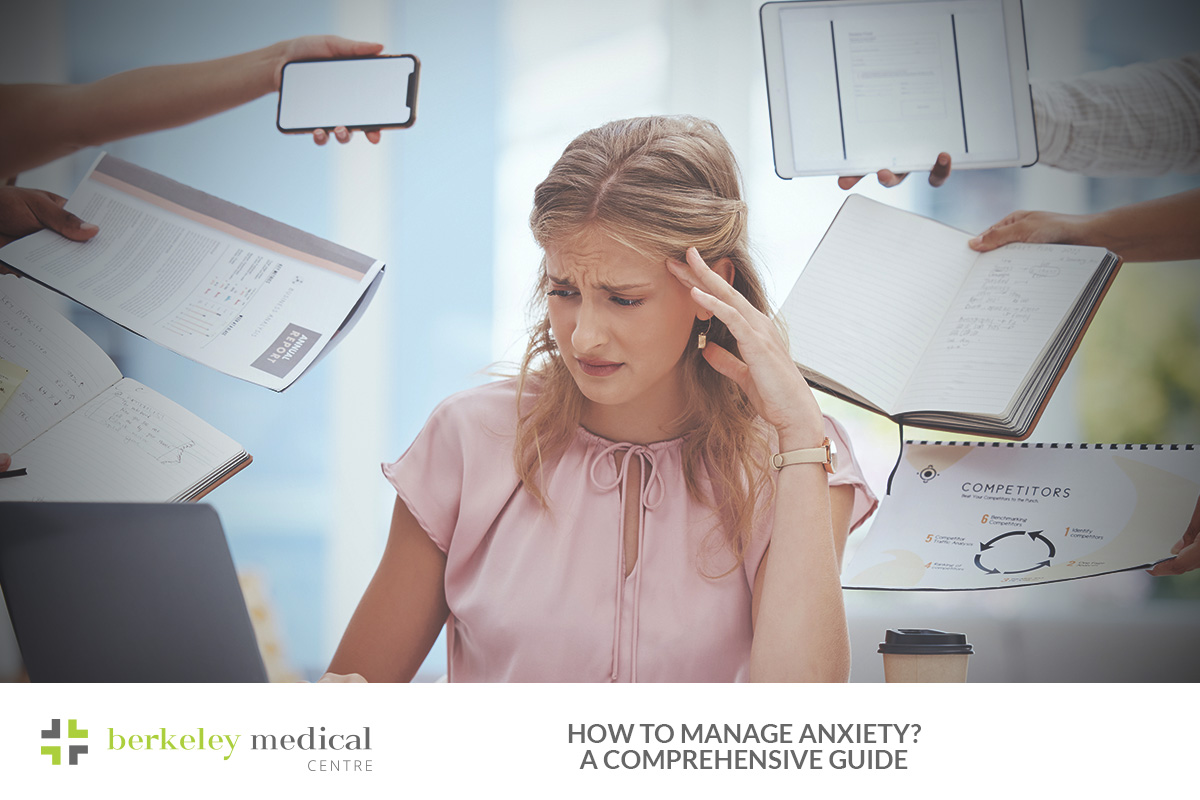Anxiety is a common mental health condition that can interfere with daily life. While it is normal to feel anxious occasionally, persistent anxiety can significantly impact your well-being. Managing anxiety requires a combination of short-term coping strategies, long-term lifestyle changes, and professional support. In this guide, we will discuss how you can effectively manage anxiety to live a healthier, more balanced life.
What Is Anxiety?
Anxiety is the body’s natural response to stress, often characterised by feelings of fear, worry, or unease. While occasional anxiety is normal, anxiety disorders involve frequent, intense worry that does not fade, even in the absence of an immediate threat.
Common symptoms of anxiety include:
- Constant worry or nervousness
- Difficulty concentrating
- Fatigue and irritability
- Rapid heart rate, sweating, and trembling
- Trouble sleeping or insomnia
Understanding the symptoms and causes of anxiety is the first step toward managing it. Anxiety can arise due to genetic predispositions, past trauma, chronic stress, or underlying health conditions. Whatever the cause, learning to manage anxiety can improve your quality of life.
Short-Term Strategies for Managing Anxiety
When anxiety strikes, it can be overwhelming. These short-term strategies can help you quickly regain control and reduce the intensity of your symptoms.
· Breathing Exercises
Deep breathing is one of the most effective ways to reduce anxiety. It helps regulate your nervous system and promotes relaxation. Try the “4-7-8” breathing technique:
- Inhale through your nose for 4 seconds
- Hold the breath for 7 seconds
- Exhale slowly through your mouth for 8 seconds
This technique helps slow down your heart rate and eases physical tension, making it easier to focus on calming down.
· Physical Movement
Exercise is a proven method to reduce anxiety. Physical activity triggers the release of endorphins, which improve mood and alleviate stress. A brisk walk, stretching, or a short workout can immediately help lower the levels.
· Journaling
Writing down your thoughts can help manage anxious feelings by providing an outlet for your worries. Journaling allows you to process your emotions and reflect on possible triggers or solutions, helping to organise and clarify your thoughts.
· Grounding Techniques
Grounding exercises are designed to help you stay present and focused, preventing your mind from being overwhelmed by anxious thoughts. The “5-4-3-2-1” grounding technique is a simple but powerful way to regain control:
- Identify 5 things you can see
- 4 things you can touch
- 3 things you can hear
- 2 things you can smell
- 1 thing you can taste
This technique refocuses your attention on your surroundings, helping you step away from anxious thoughts.
· Listening to Music
Listening to calming music can soothe the mind and body. Create a playlist of your favourite relaxing songs or calming nature sounds to use when you are feeling anxious.
Long-Term Strategies for Managing Anxiety
While short-term fixes can provide immediate relief, long-term strategies are essential for addressing the underlying causes of anxiety and building resilience.
Prioritising Sleep
Anxiety and poor sleep often go hand in hand. Improving sleep quality can significantly reduce anxiety over time. Aim for 7-9 hours of sleep each night and create a calming bedtime routine. Avoid screens, caffeine, and large meals before bed to encourage restful sleep.
Healthy Eating Habits
A balanced diet can positively affect mental health. Focus on whole foods rich in nutrients, like fruits, vegetables, whole grains, and lean proteins. Avoid excessive caffeine and sugar, which can exacerbate anxiety.
Foods high in omega-3 fatty acids, such as salmon and walnuts, and magnesium-rich foods like leafy greens can help support better mental health.
Regular Exercise
Regular physical activity is one of the most effective long-term solutions for managing anxiety. Exercise reduces the body’s stress hormones and increases endorphins, improving mood. Try to engage in 30 minutes of moderate exercise most days of the week, whether it is walking, jogging, or swimming.
Mindfulness and Meditation
Mindfulness practices such as meditation can help you stay present and reduce anxious thoughts. Meditation teaches you to observe your thoughts without judgment, helping to reduce the intensity of negative emotions. Even practicing mindfulness for a few minutes a day can have lasting benefits for your mental health.
Time Management and Organisation
Feeling overwhelmed by tasks can increase anxiety. Organising your time effectively can help reduce stress. Use a planner to break tasks into smaller, more manageable steps, and set realistic goals. Prioritising your time helps create a sense of control, which can alleviate feelings of anxiety.
Building a Support Network
Talking to supportive friends or family members can help reduce feelings of isolation. A strong support network provides a safe space to share your experiences, get advice, and receive emotional support. If you are uncomfortable sharing with friends or family, joining a support group can provide a community of individuals who understand what you are going through.
Professional Treatment Options
For some, managing anxiety may require professional intervention. Fortunately, there are several evidence-based treatment options available.
General Practitioners (GPs)
Your GP can help assess your symptoms and recommend a treatment plan. They may suggest therapy, medication, or lifestyle changes depending on the severity of your anxiety. GPs are often the first point of contact for management and can guide you toward the most appropriate resources.
Psychological Therapies
Cognitive Behavioural Therapy (CBT) is a highly effective treatment for anxiety. CBT helps you identify and change unhelpful thinking patterns and behaviours that contributes. Other therapies, such as mindfulness-based therapy or acceptance and commitment therapy (ACT), can also be helpful depending on your needs.
Medication
For those with severe anxiety, medication may be recommended as part of their treatment plan. Selective serotonin reuptake inhibitors (SSRIs) are commonly prescribed and can help reduce its symptoms. Anti-anxiety medications may also be prescribed for short-term use. Your GP or psychiatrist will work with you to determine whether medication is the right option.
Allied Health Services
Mental health professionals, including psychologists, counsellors, and social workers, offer therapeutic services to help manage it. These professionals provide support in building coping strategies, managing triggers, and improving overall emotional resilience.
Conclusion
Managing anxiety is a multifaceted process that requires both short-term strategies for immediate relief and long-term lifestyle changes to address the root causes. With the right techniques—such as mindfulness, exercise, and healthy sleep habits—you can significantly reduce anxiety levels and improve your quality of life. If it is affecting your daily routine, seeking professional help is an important step. At Berkeley Medical Center, we are committed to supporting you in managing anxiety through personalised care and a wide range of healthcare services. By addressing your mental health needs with compassion and expertise, we aim to help you regain control and live a more fulfilling life.








1 thought on “How to Manage Anxiety: A Comprehensive Guide”